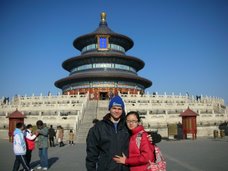An Incident by Lu Xun
Six years have slipped by since I came from the country to the capital. During that time I have seen and heard quite enough of so-called affairs of state; but none of them made much impression on me. If asked to define their influence, I can only say they aggravated my ill temper and made me, frankly speaking, more and more misanthropic.
One incident, however, struck me as significant, and aroused me from my ill temper, so that even now I cannot forget it.
It happened during the winter of 1917. A bitter north wind was blowing, but, to make a living, I had to be up and out early. I met scarcely a soul on the road, and had great difficulty in hiring a rickshaw to take me to S-Gate. Presently the wind dropped a little. By now the loose dust had all been blown away, leaving the roadway clean, and the rickshaw man quickened his pace. We were just approaching S-Gate when someone crossing the road was entangled in our rickshaw and slowly fell.
It was a woman, with streaks of white in her hair, wearing ragged clothes. She had left the pavement without warning to cut across in front of us, and although the rickshaw man had made way, her tattered jacket, unbuttoned and fluttering in the wind, had caught on the shaft. Luckily the rickshaw man pulled up quickly, otherwise she would certainly have had a bad fall and been seriously injured.
She lay there on the ground, and the rickshaw man stopped. I did not think the old woman was hurt, and there had been no witnesses to what had happened, so I resented this officiousness which might land him in trouble and hold me up.
'It's all right,' I said. 'Go on.'
He paid no attention, however -- perhaps he had not heard -- for he set down the shafts, and gently helped the old woman to get up. Supporting her by one arm, he asked:
'Are you all right?'
'I'm hurt.'
I had seen how slowly she fell. and was sure she could not be hurt. She must be pretending, which was disgusted. The rickshaw man had asked for trouble, and now he had it. He would have to find his own way out.
But the rickshaw man did not hesitate for a minute after the old woman said she was injured. Still holding her arm, he helped her slowly forward. I was surprised. When I looked ahead, I saw a police station. Because of the high wind, there was no one outside, so the rickshaw man helped the old woman towards the gate.
Suddenly I had a strange feeling. His dusty, retreating figure seemed larger at that instant. Indeed, the further he walked the larger he loomed, until I had to look up to him. At the same time he seemed gradually to be exerting a pressure on me, which threatened to overpower the small self under my fur-lined gown.
My vitality seemed sapped as I sat there motionless, my mind a blank, until a policeman came out. Then I got down from the rickshaw.
The policeman came up to me, and said, 'Get another rickshaw. He can't pull you any more.'
Without thinking, I pulled a handful of coppers from my coat pocket and handed them to the policeman. 'Please give him these, I said.
'Even now, this remains fresh in my memory. It often causes me distress, and makes me try to think about myself. The military and political affairs of those years I have forgotten as completely as the classics I read in my childhood. Yet this incident keeps coming back to me, often more vivid than in actual life, teaching me shame, urging me to reform, and giving me fresh courage and hope.
(*Recently, I reported an incident where a man fled on motorcycle after he had hit a man on a bicycle.*)
And we can hardly sneer at the Americans, after we accepted 16 years of Pierre Trudeau. There will always be demagogues, as there will always be people eager to follow them, into new "promised lands."
...the experience of beauty, beauty that is authentic, not merely transient or artificial, is by no means a supplementary or secondary factor in our search for meaning and happiness; the experience of beauty does not remove us from reality, on the contrary, it leads to a direct encounter with the daily reality of our lives, liberating it from darkness, transfiguring it, making it radiant and beautiful.
Indeed, an essential function of genuine beauty, as emphasized by Plato, is that it gives man a healthy "shock", it draws him out of himself, wrenches him away from resignation and from being content with the humdrum -- it even makes him suffer, piercing him like a dart, but in so doing it "reawakens" him, opening afresh the eyes of his heart and mind, giving him wings, carrying him aloft. Dostoevsky's words that I am about to quote are bold and paradoxical, but they invite reflection. He says this: "Man can live without science, he can live without bread, but without beauty he could no longer live, because there would no longer be anything to do to the world. The whole secret is here, the whole of history is here." The painter Georges Braque echoes this sentiment: "Art is meant to disturb, science reassures." Beauty pulls us up short, but in so doing it reminds us of our final destiny, it sets us back on our path, fills us with new hope, gives us the courage to live to the full the unique gift of life. The quest for beauty that I am describing here is clearly not about escaping into the irrational or into mere aestheticism.








No comments:
Post a Comment